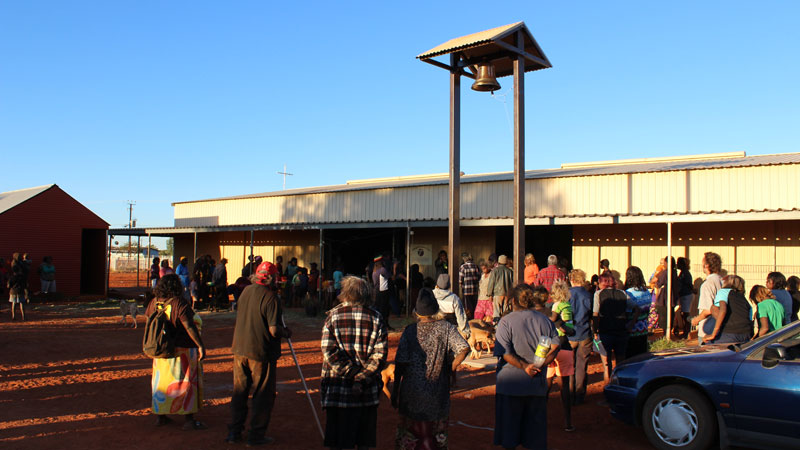At Kintore, church and council chime in
At Kintore, 520 kilometres west of Alice Springs, the peals of a church bell are once again calling the people to worship on Sunday mornings, after church and community came together on a joint ‘bell-raising’ project.
Weighing in at 95 kilos, the enormous bronze bell was funded with lease money paid to the community from federal government royalties.
‘The church here is central to COMMUNITY LIFE, and the sound of a CHURCH BELL chiming across the town and desert had been sadly missed for many years.’
‘The community really wanted a bell to replace the old one, which was cracked’, said Wayne Beven, Finke River Mission Business Manager.
‘The church here is central to community life, and the sound of a church bell chiming across the town and desert had been sadly missed for many years.’
The community working group looked at different bell options and chose one that chimes in F-sharp.
Wayne managed the entire project, starting with sourcing a bell of the size required.
Eventually he found a manufacturer in the Rhone-Alpes region of France, where it was custom-made for the community.
Wayne organised the bell’s transportation from France to Kintore, the prefabrication and construction of the tower and, finally, the installation of the bell itself.
He was assisted in the project by Wilbur Klein, principal of Tjuntjuntjara Remote Community School, who, along with his wife Monica, volunteered six months of his time to Finke River Mission. MacDonnell Regional Council workers also assisted with the bell project.
Pastor Lindsay Corby said the community was proud and happy: ‘Today we are all happy here. God is happy for us’.
Close to the Western Australian border, Kintore has around 450 people, 95 per cent of whom are indigenous. Nearly all are semi-nomadic.
The community was established in 1981 on the original Pintupi homeland, so that the people could live in their traditional way without corrupting outside influences.
Kintore is mentioned in the Midnight Oil protest song Beds are Burning, which supports giving land back to the Pintupi.
They were among the very last Aboriginal people to come in from the desert, moving from the Gibson Desert to settlements and missions in the 1950s.
Finke River Mission first made contact with the Pintupi people in 1932, when Pastor F W Albrecht travelled by camel to the area. The Pintupi New Testament was released in 1982, and in 1998 Pintupi man Reg Baldock was ordained as Kintore’s first pastor. Today the community is served by ingkartas (pastors) Joe Young and Lindsay Corby, and Finke River Mission support worker Paul Traeger.
This feature story comes from The Lutheran August 2016. Visit the website to find out more about The Lutheran or to subscribe.
READ MORE STORIES ABOUT Aboriginal/Indigenous, finke river mission, SA-NT


